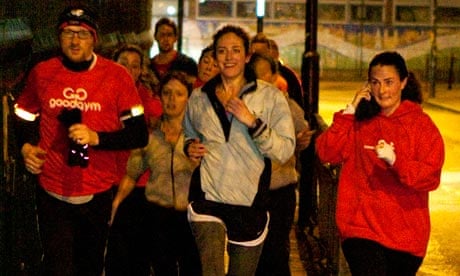Every Thursday evening, whatever the weather, Harriet Cawley runs two-and-a-half miles from Shoreditch, east London, to the home of her coach, Michael Mulcahy. Cawley regularly undertakes half-marathons but this is no ordinary training session. Mulcahy is a house-bound widower who enjoys receiving a London Evening Standard from Cawley and having a chat for half-an-hour. After which, Cawley runs home again.
Cawley is a member of the Good Gym, a not-for-profit organisation that encourages people to combine their exercise regime with a spot of social care, matching busy workers with elderly "coaches", who receive a daily paper or other modest delivery and, in turn, provide an incentive for their weekly visitors to keep on running. Set up two-and-a-half years ago, the Good Gym is this year expanding across all Olympic boroughs, part-funded by the Olympic Park Legacy Company.
The Good Gym was the brainchild of Ivo Gormley, 29, who discovered that combining a weekly run with a visit to a housebound friend of the family was just the motivation he needed to keep him exercising; it helped that his elderly friend was a former boxer who could offer training tips. As Gormley did his prescribed situps, he thought about how best to link up a series of very modern disconnects: how few people have the time or energy to volunteer and yet use gyms to burn off excess energy; and how little dialogue there is between working people and the elderly, particularly in densely populated urban communities.
"Gyms are this ridiculous invention," says Gormley. "People have got too much energy and go to these weird places where they get purged of it by machines. I thought we could channel the energy from people's exercise into something more productive."
Through working with the NHS, charities and local community centres, including The Sundial Centre in Bethnal Green and Toynbee Hall, the Good Gym matches runners with an individual coach – a housebound elderly person who would like a regular visitor. They are encouraged to take a newspaper or a modest gift to the value of £1.
There are also monthly group runs around east London, to perform useful activities along the way. So far Good Gym members have distributed flyers for a local hospice, tidied up community gardens and hauled compost on to a school roof. Two runners are now being sought for a somewhat unusual task: taking donkeys from Stepney City Farm for a trot. (The donkeys need the exercise to keep their hooves down; donkey handling training will be provided.)
Cawley, 38, a costume stylist, heard about the Good Gym through Twitter. "It seemed such a brilliant idea," she says. It took four months for her to be checked by the Criminal Records Bureau (the Good Gym now uses a company to speed up this process and claims it takes just a couple of weeks), then she was assigned Mulcahy to run to, based on the distance she requested.
Having a break in her running works well from a training point of view: she does a speed run to Mulcahy's house, rests there, then a does a more gentle, warm-down jog on the way home. Cawley is from Stockport and has no grandparents in London, so enjoys chatting to her elderly coach – "someone I would never have met," she says. While the Good Gym advises runners to stay for about 10 minutes, Cawley sometimes chats to Mulcahy for an hour. Although he has family, and regular visits from professional carers, Cawley thinks he enjoys a visit from someone who does not worry like relatives and is not there out of professional duty. She didn't really know what he made of "this random person turning up and chatting to him" until she told him she was going away on holiday. "He said: 'I'll really miss you.'"
Terry Duncan, 67, a retired printer from Stepney, uses an electric wheelchair after a stroke. He is regularly visited by Sally, another Good Gym member. "It's lovely. I look forward to her coming," he says. He played football when he was younger, but is not sure how much use he is as a coach. "I don't coach her," he says. What about a mid-run cup of tea? "She normally has a glass of water. She's a bit hot and sweaty but sits down and has a chat. We've become good friends."
Duncan has recommended the Good Gym to several immobile neighbours, but says they are "a bit dubious about strangers coming into their house". Despite these fears, the Good Gym is expanding, with interest in Edinburgh and a Good Gym run in Chicago. Most significant this year will be its Olympics expansion. As organisers hope the Games will leave a more enduring legacy in east London, Gormley wants his enterprise to become a social norm for the young professionals moving into the new housing around the Olympic Park. "It's an amazing opportunity to shape the culture of a new area," he says. "And link it to the existing community."

Comments (…)
Sign in or create your Guardian account to join the discussion